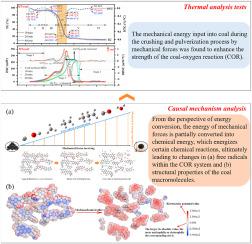Our official English website, www.x-mol.net, welcomes your
feedback! (Note: you will need to create a separate account there.)
Effect of mechanical energy input during mechanical crushing on the macrokinetics of the coal–oxygen reaction: A laboratory–scale study
Energy ( IF 9.0 ) Pub Date : 2024-01-04 , DOI: 10.1016/j.energy.2023.130217 Xinlei Yang , Tingxiang Chu , Minggao Yu , Liang Wang , Haitao Li , Wushuang Wen , Mingqiu Wu , Fengchuan Wang , Jiachen Wang
Energy ( IF 9.0 ) Pub Date : 2024-01-04 , DOI: 10.1016/j.energy.2023.130217 Xinlei Yang , Tingxiang Chu , Minggao Yu , Liang Wang , Haitao Li , Wushuang Wen , Mingqiu Wu , Fengchuan Wang , Jiachen Wang

|
Underground mining is usually simplified as a process of coal crushing and pulverization. However, this process is not purely physical. The mechanical energy input to this process also induces a mechanochemical effect. The specific impact of this effect on the macrokinetics of the coal–oxygen reaction (COR) has not been independently investigated, which motivates this work. Thermal analysis tests showed that mechanical energy input contributed to the strength of the COR and exhibited regularities in its impact on COR's kinetic parameters. Explanations for this were given based on mechanochemistry, free radicals chain reaction and quantum chemistry theories. A coal macromolecule model, influenced by mechanical energy input, was developed based on the typical Wiser model, and subsequent quantum mechanical calculations were conducted. It was found that mechanical energy input facilitated the breaking of specific chemical bonds in coal, redistributing the electrostatic potential and increasing the number of active sites within the coal molecule. Moreover, both the free radicals from bonds breaking and the remaining active structural sites exhibited an increasing trend in their electrified capacities. Different from the traditional physical pathway, this work refined the mechanism by which mechanical forces affect COR through the mechanochemical pathway.
中文翻译:

机械破碎过程中机械能输入对煤-氧反应宏观动力学的影响:实验室规模的研究
地下采矿通常被简化为煤炭破碎和粉碎的过程。然而,这个过程并不纯粹是物理的。输入到这个过程的机械能也会引起机械化学效应。这种效应对煤-氧反应 (COR) 宏观动力学的具体影响尚未得到独立研究,这激发了这项工作的动机。热分析测试表明,机械能输入有助于 COR 的强度,并且其对 COR 动力学参数的影响表现出规律性。对此的解释是根据机械化学、自由基链式反应和量子化学理论给出的。在典型的 Wiser 模型的基础上,开发了受机械能输入影响的煤大分子模型,并随后进行了量子力学计算。研究发现,机械能输入促进了煤中特定化学键的断裂,重新分配了静电势并增加了煤分子内活性位点的数量。此外,键断裂产生的自由基和剩余的活性结构位点的电气化能力都表现出增加的趋势。与传统的物理途径不同,这项工作改进了机械力通过机械化学途径影响 COR 的机制。
更新日期:2024-01-04
中文翻译:

机械破碎过程中机械能输入对煤-氧反应宏观动力学的影响:实验室规模的研究
地下采矿通常被简化为煤炭破碎和粉碎的过程。然而,这个过程并不纯粹是物理的。输入到这个过程的机械能也会引起机械化学效应。这种效应对煤-氧反应 (COR) 宏观动力学的具体影响尚未得到独立研究,这激发了这项工作的动机。热分析测试表明,机械能输入有助于 COR 的强度,并且其对 COR 动力学参数的影响表现出规律性。对此的解释是根据机械化学、自由基链式反应和量子化学理论给出的。在典型的 Wiser 模型的基础上,开发了受机械能输入影响的煤大分子模型,并随后进行了量子力学计算。研究发现,机械能输入促进了煤中特定化学键的断裂,重新分配了静电势并增加了煤分子内活性位点的数量。此外,键断裂产生的自由基和剩余的活性结构位点的电气化能力都表现出增加的趋势。与传统的物理途径不同,这项工作改进了机械力通过机械化学途径影响 COR 的机制。































 京公网安备 11010802027423号
京公网安备 11010802027423号